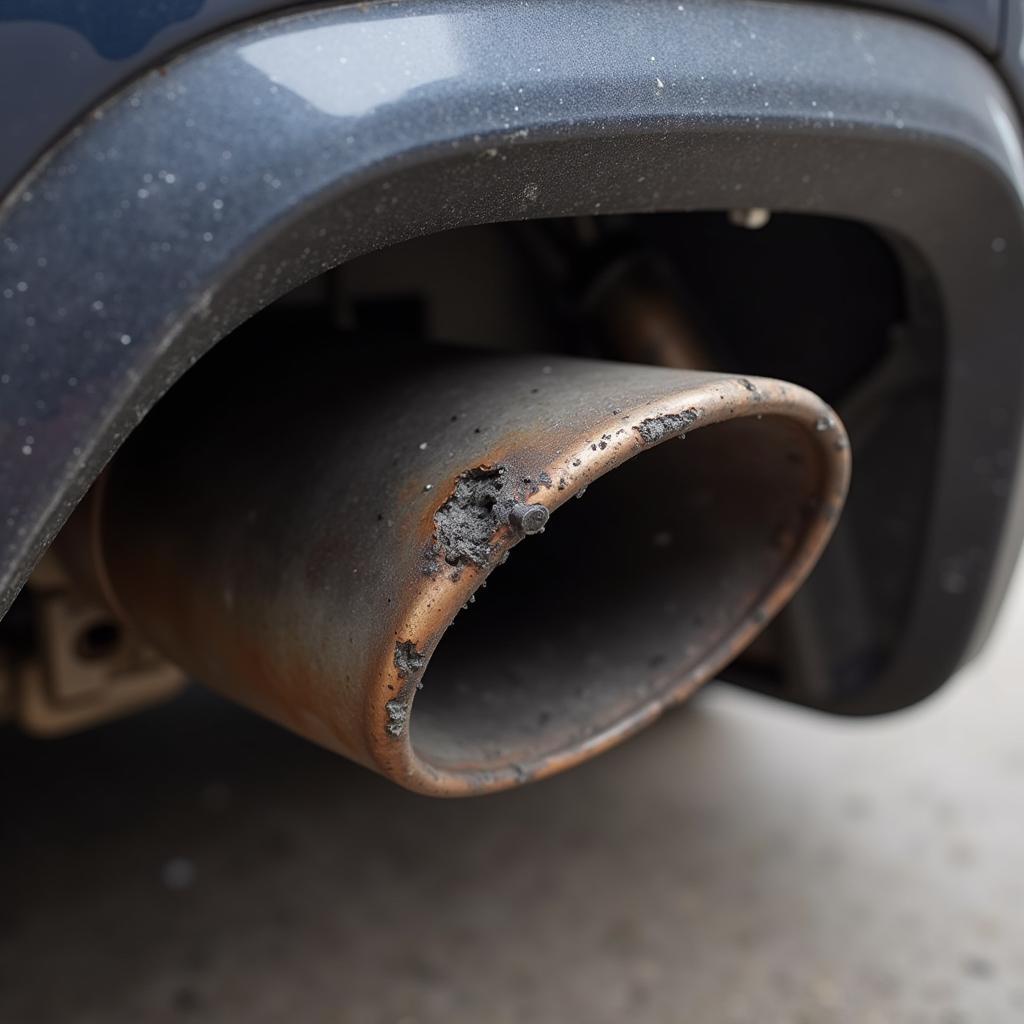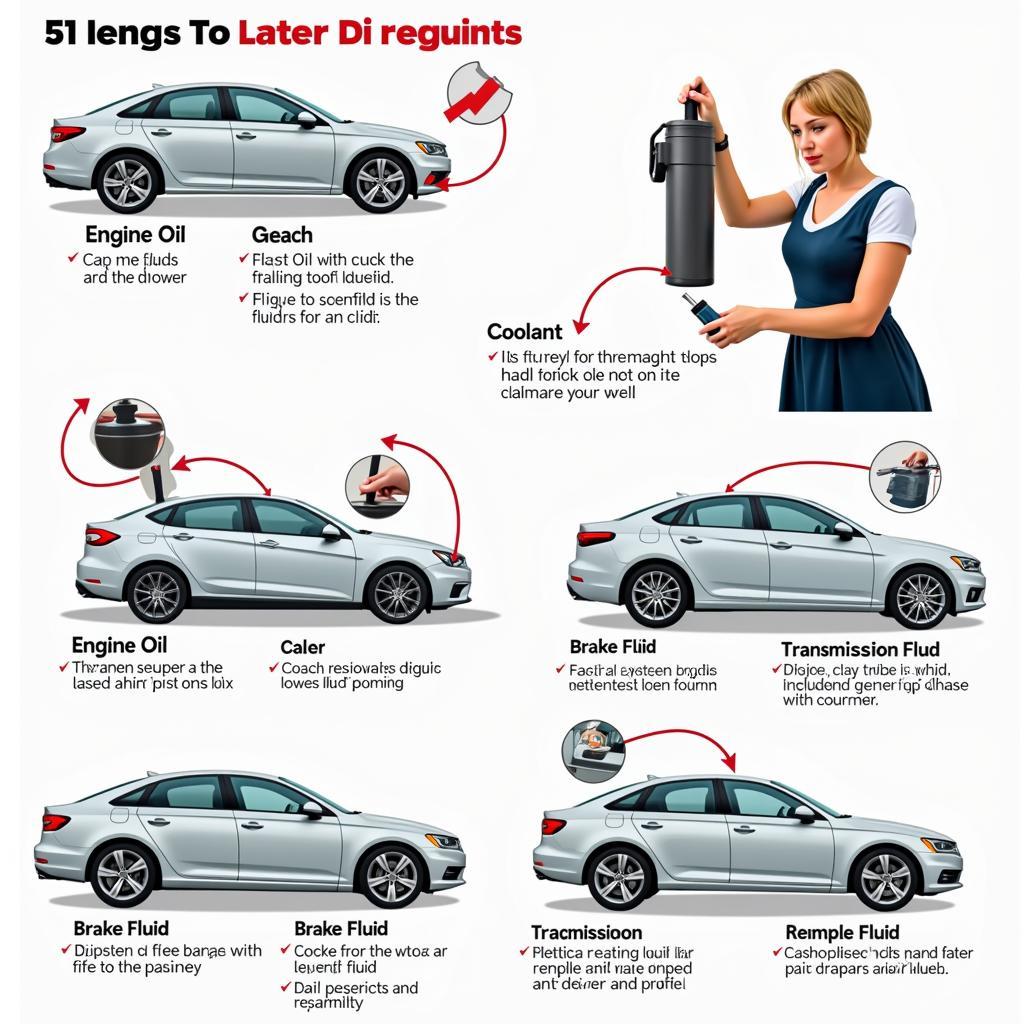If you’re asking yourself, “How can I fix my car that’s running too rich?”, you’ve come to the right place. A rich fuel mixture can lead to various problems, from poor fuel economy and rough idling to black smoke from the exhaust and even damage to your catalytic converter. This article will guide you through the potential causes and solutions for a rich running engine, empowering you to diagnose and potentially fix the issue yourself or discuss it intelligently with a mechanic.
Understanding a Rich Fuel Mixture
A “rich” mixture means there’s too much fuel compared to the air entering your engine’s cylinders. This imbalance disrupts the combustion process, leading to incomplete burning of fuel. Recognizing the symptoms is the first step towards fixing the problem.
Common Symptoms of a Rich Running Engine
Several tell-tale signs indicate a rich fuel mixture:
- Black smoke from the exhaust: This is a classic symptom of incomplete combustion.
- Strong fuel smell: You might notice a raw gasoline odor from the exhaust.
- Rough idle: The engine may stumble or shake when idling.
- Poor fuel economy: A rich mixture significantly reduces fuel mileage.
- Decreased engine performance: You may experience a loss of power and acceleration.
- Fouled spark plugs: Excess fuel can coat the spark plugs, hindering their ability to ignite the mixture.
Diagnosing the Cause of a Rich Fuel Mixture: Where to Start
Identifying the root cause requires a systematic approach. Here’s a breakdown of the common culprits:
Faulty Oxygen Sensor(s)
The oxygen sensor(s) play a critical role in monitoring the exhaust gases and adjusting the fuel-air ratio. A malfunctioning sensor can provide incorrect data to the engine control unit (ECU), leading to a rich mixture.
 Faulty Oxygen Sensor in Car Exhaust System
Faulty Oxygen Sensor in Car Exhaust System
Malfunctioning Fuel Injectors
Fuel injectors are responsible for delivering the precise amount of fuel to each cylinder. A leaking or stuck-open injector can cause an oversupply of fuel, resulting in a rich mixture.
Faulty Coolant Temperature Sensor
The coolant temperature sensor informs the ECU about the engine’s temperature. A faulty sensor can make the ECU think the engine is cold, leading it to enrich the fuel mixture unnecessarily.
Faulty Fuel Pressure Regulator
The fuel pressure regulator maintains the correct fuel pressure in the fuel system. A malfunctioning regulator can cause excessively high fuel pressure, forcing too much fuel into the cylinders.
Vacuum Leaks
Vacuum leaks can disrupt the air intake system, introducing unmetered air and upsetting the fuel-air balance. This can trick the ECU into adding more fuel, creating a rich mixture.
Choked Air Filter
A dirty or clogged air filter restricts airflow to the engine, leading to a richer fuel mixture as the ECU attempts to compensate for the reduced air intake.
How Can I Fix My Car That’s Running Too Rich? – Step-by-Step Guide
Before attempting any repairs, disconnect the negative battery cable for safety.
- Check the air filter: Inspect the air filter for dirt and clogs. Replace it if necessary. This is a simple and inexpensive fix that can often resolve a rich mixture.
- Inspect for vacuum leaks: Carefully examine vacuum hoses and connections for cracks, splits, or loose fittings. Use a vacuum leak tester or carburetor cleaner to pinpoint leaks. Repair or replace any damaged hoses.
- Check the fuel pressure: Use a fuel pressure gauge to measure the fuel pressure. Compare the reading to the manufacturer’s specifications. If the pressure is too high, the fuel pressure regulator may need replacement.
- Inspect the fuel injectors: Check the fuel injectors for leaks or sticking. You can use a noid light to test the electrical signal to the injectors. Consider professional cleaning or replacement if necessary.
- Test the oxygen sensor(s): Use a multimeter or a dedicated oxygen sensor tester to check the sensor’s output voltage. Compare the readings to the manufacturer’s specifications. Replace faulty sensors.
- Test the coolant temperature sensor: Use a multimeter to test the sensor’s resistance at different temperatures. Compare the readings to the manufacturer’s specifications. Replace a faulty sensor.
Conclusion: Getting Your Car Back on Track
Addressing a rich running engine is crucial for maintaining optimal performance, fuel efficiency, and preventing potential damage to your vehicle’s components. By understanding the causes and symptoms and following the diagnostic steps outlined above, you can effectively troubleshoot the issue. Remember, safety first! Always disconnect the negative battery cable before working on your car’s electrical or fuel system. If you’re unsure about any of the steps, consult a qualified mechanic.
For further assistance and expert advice, connect with us at AutoTipPro. Call us at +1 (641) 206-8880 or visit our office at 500 N St Mary’s St, San Antonio, TX 78205, United States. We’re here to help you get your car running smoothly again!
FAQ
-
What are the long-term effects of a rich fuel mixture? Damage to the catalytic converter, reduced engine life, and increased emissions.
-
Can a rich fuel mixture cause my car to fail emissions testing? Yes, a rich mixture often leads to elevated hydrocarbon and carbon monoxide emissions.
-
Is it safe to drive my car if it’s running rich? It’s best to avoid driving extensively as it can damage your catalytic converter.
-
How much does it typically cost to fix a rich fuel mixture? The cost varies depending on the underlying cause, ranging from a simple air filter replacement to more expensive repairs like fuel injector or oxygen sensor replacement.
-
Can I use a fuel additive to fix a rich fuel mixture? Fuel additives are not a long-term solution and won’t address the underlying mechanical issue causing the rich mixture.
-
How often should I check my car for a rich fuel mixture? Regular maintenance, including checking the air filter and spark plugs, can help prevent a rich fuel mixture.
-
Can a bad fuel pump cause a rich fuel mixture? While less common, a failing fuel pump could contribute to a rich mixture, but usually it results in a lean mixture.





Leave a Reply